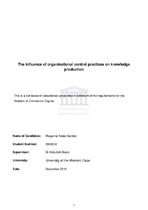| dc.description.abstract | This study explores the relationship between knowledge creation and organisational and managerial control. I explore how organisational control impacts, influences, shapes, fashions and lay the foundation for the creation of the various types of knowledge within a research organisation. In particular, the aim of the study is to explore the influence that organisational control systems have on knowledge workers' capacity to generate new research knowledge. The literature on knowledge management reveals that there has been a lot of focus on knowledge creation. However, from my review of the literature there have not been sufficient research studies that explore organisational control mechanisms in facilitating or inhibiting the creation of knowledge. In addressing the research problem, this study intends to explore this gap. From an organisational control aspect, I draw on the Foucauldian toolbox using disciplinary power, pastoral power, and technologies of the self. Thereafter I develop a conceptual model in which I integrate knowledge creation and organisational control mechanisms. The research approach that I employed is a qualitative approach. In particular, I adopted a case study research design. Data was primarily collected using interviews and observation. Data analysis was conducted using a thematic approach. The research site was a national research company with their head office in Cape Town. All individuals within the organisation, including the managing director were comprehensively interviewed. From the data analysis, using the conceptual model I formulated, I made the claim that mechanisms of organisational and managerial control aided and facilitated certain modes of knowledge creation. Furthermore, the findings highlighted that employees acknowledged that organisational and managerial practices aided them in producing knowledge. The data analysis further confirmed the explanatory power of my conceptual model. The original model was structured on the premise that a particular organisational mechanism was dominate for each of the various stages in the knowledge creation process. The data provided evidence that all organisational control mechanism overlapped for each of the knowledge creation processes and therefore the model was re-worked. However, due to certain limitations, more research in this field is required to be able to explore further the nature of the relationship between knowledge creation and organisational control practices. | en_US |

